Global
Copyright@ Australian Catholic University 1998-2026 | ABN 15 050 192 660 CRICOS registered provider: 00004G | PRV12008
Copyright@ Australian Catholic University 1998-2026 | ABN 15 050 192 660 CRICOS registered provider: 00004G | PRV12008
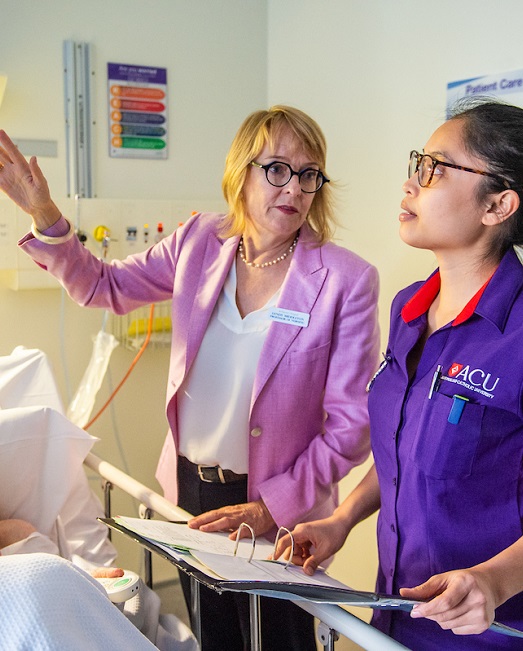
Years ago, when Sandy Middleton worked as a registered nurse in a regular medical ward, she had her first exposure to patients who had suffered an acute stroke. It was the early 1980s and the standard care protocol involved a ‘wait-and-see’ approach, as healthcare staff monitored patients for deficits like impaired speech and restricted physical abilities.
“This was my very first ward as a nurse,” she recalls, “and I remember that we would care for patients with stroke out on the ward veranda. It was rather nice out there in that it was a bit quieter, but it also reflected the lack of proven stroke treatments available at the time; patients were located there while their stroke evolved and any deficits manifested.”
It wasn’t common knowledge at the time that when a patient has a stroke, rapid treatment is crucial.
“There wasn’t really an understanding that the rehabilitation process for stroke needs to start early, and unfortunately that meant there was very little active treatment for these patients.”
Little did Sandy Middleton know that as her nursing career evolved, she would pioneer an extensive program of research that would transform stroke patient care.
In the years leading up to 2011, Professor Middleton was the lead investigator in a landmark NHMRC-funded study, the Quality in Acute Stroke Care (QASC) Trial, showing that simple nursing protocols were not only effective in minimising the effects of acute stroke, they could also save lives.
The cluster randomised trial, which involved more than 1,600 patients in 19 acute stroke units across New South Wales, found that supported implementation of nurse-initiated protocols to manage fever (Fe), blood sugar levels (S) and swallowing (S) (FeSS) significantly improved patient outcomes.
“As a direct result of that research, clinical nurses in stroke units have a better understanding of the importance of these protocols and the difference they can make to patients,” says Professor Middleton, who joined ACU in 2005 and has been Director of the Nursing Research Institute, a collaboration between ACU and St Vincent’s Hospital in Sydney and Melbourne, since 2008.
In recent years, the Quality in Acute Stroke Care (QASC) research program has spread far and wide. While it’s difficult to determine exactly how vast the take-up has been, the QASC FeSS Protocols have been officially trialled and implemented in Australia, New Zealand and 18 European nations – including some countries where access to “clot buster” medicines, which can quickly dissolve the clots that cause many strokes, is limited.
As a result, Professor Middleton and the QASC research team have received more than a dozen accolades for this work: the 2023 American Heart Association’s Stroke Article of the Year Award, the 2023 Australian Cardiovascular Alliance’s prestigious Translation Award, the inaugural Health Minister’s Award for Nursing Trailblazers, and the 2019 ACU Vice-Chancellor’s Staff Excellence Award for Research and Research Partnership, to name a few.
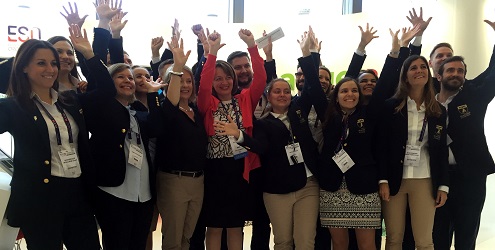
ESOC Angels 2017 – European Stroke Organisation Conference award winners for stroke care.
“As a nurse, the biggest motivator is the benefit you can see this is having to patients, and that’s always going to be the number one driver,” says Professor Middleton, who was the first-ever inductee into the St Vincent’s Health Network’s Nursing Hall of Fame, and has successfully obtained research grants totalling more than $98 million.
“At the same time, it does humble you to win these awards and we never take them for granted. You spend hours and hours with your team in your office, beavering away at your research, and for the scientific community to decide it’s something important and something worth adopting, you have to allow yourself the moment where you actually look up and think, ‘Oh wow, we did some good’.”
Sandy Middleton’s progression from clinical nurse to one of Australia’s leading nursing researchers didn’t happen overnight.
While at school, she was interested in human biology, and also felt a pull towards helping and caring for people. This made her eventual choice to pursue a career in nursing feel like “the natural thing to do”, and after earning her nursing diploma in 1981, she went on to work in two Sydney hospitals, moving to London in 1984 to take on a role as an intensive care nurse.
“I loved the hands-on task of looking after critically ill patients and seeing them get better,” says Professor Middleton, who lived and worked in the UK for the best part of a decade. “It was quite a formative thing for me.”
As she grew into an experienced ICU nurse, she found herself critically examining nursing practices: Was there a better way of doing things to improve care and outcomes for her patients? A different treatment or medication that would aid recovery and rehabilitation?
By the time she had returned to Australia and completed both undergraduate and postgraduate nursing degrees at the University of Sydney, Sandy Middleton had moved inexorably in the direction of academic research – of knowledge creation, rather than simply knowledge use.
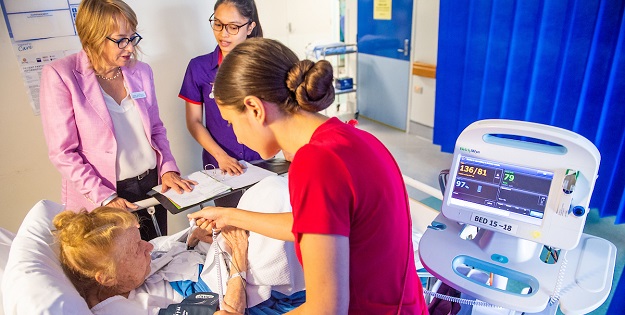
Through her PhD in medicine, she spent three years examining carotid endarterectomy, a procedure designed to reduce the risk of stroke. It was “an absolute dream to be offered this pathway”, says Professor Middleton, acknowledging, however, that it was a difficult decision to leave clinical nursing behind.
“I had come to the point in my career where there was no option but to decide which way I was heading,” she says, “and looking back, I was a bit sad that it had to be so absolute.”
Since joining ACU in 2005, Professor Middleton has blazed a trail for other nurses to follow.
Not only has she led by example, showing the immense value of nurse-led research, but with colleagues from the Maridulu Budyari Gumal, Sydney Partnership for Health Education, Research and Enterprise (SPHERE) Nursing and Midwifery Implementation Science Academy, she has also helped to develop a clinician research pathway for nurses and midwives – a bid to harness the frontline workforce to boost Australia’s clinical research impact.
While a dual-career pathway has long been common in medicine and allied health disciplines, it is still rare for nurses to straddle the worlds of research and clinical practice.
“We need this initiative to really take off across Australia, because nurses are ideal people to lead research that improves clinical practice and health outcomes,” says Professor Middleton, who leads the SPHERE Nursing and Midwifery Implementation Science Academy, which developed the pathway.
“We want to see more opportunities where nurses can have a blended clinical researcher role, so we get more of them leading research and producing evidence that improves patient care.”
One of Professor Middleton’s major accomplishments as a nursing researcher is that her work has swiftly made its way into real-world practice.
Under her leadership, the Nursing Research Institute has become one of Australia’s most productive nursing research collaboratives, with a reputation for using rigorous evidence to transform clinical care.
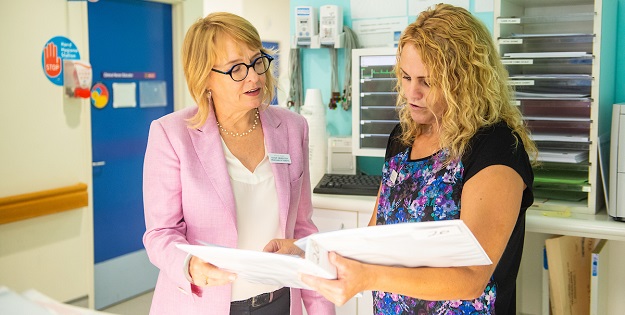
Key to its success is its focus on implementation science research, which aims to close the gap between what we know, and what we do, in healthcare.
“In theory, you wouldn’t think you’d need this kind of research because when the evidence changed, people would see it and think, ‘Oh, we’re going to implement that at our place tomorrow’,” Professor Middleton says. “Unfortunately there’s often a significant delay in getting research into practice, and that’s why there’s now a whole stream of research internationally looking at implementing evidence and achieving behaviour change in these very busy and complex clinical environments.”
While implementation can be challenging, Professor Middleton’s own experience shows that it’s possible to translate evidence into practice quickly and effectively.
“It is a major challenge because in every hospital you go to, you’ll have people who will say, ‘I see what the evidence says but that isn’t going to work here – it’s too hard, it will take too long’ and a whole range of other reasons,” she says. “Despite these challenges, we’ve made positive progress in translating and implementing evidence, and we’ve often done that by addressing the barriers and working out solutions that are specific to the clinicians and the institutions we’re working with.”
Some four decades on from her first nursing role, Professor Middleton remains mindful of the underlying role and duty that nurses have to care for their patients. Whether it’s implementing better care protocols in acute stroke units across the world, or helping healthcare institutions to adopt new evidence-based practices, she is full of energy for the challenges ahead.
“As a ward nurse, the thing that would get me out of bed each day was knowing that I could make decisions and take action to help patients get better,” she says. “With our research, it’s the same motivator, because I have a genuine belief that what we do at the Nursing Research Institute benefits patients. That’s something I am really proud of, and that’s why my team and I show up each day with a goal to do a good job, and the drive to achieve meaningful change.”
Professor Sandy Middleton is one of Australia’s leading nursing researchers, with a focus on stroke care nursing and implementation science. During her career she has earned national and international awards, and has published in high impact journals including The Lancet and The New England Journal of Medicine.
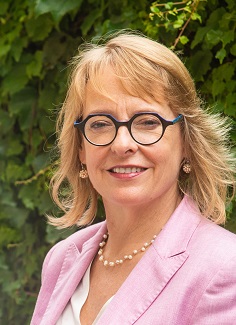
Keen to pursue a career in nursing? Explore the options.
Copyright@ Australian Catholic University 1998-2026 | ABN 15 050 192 660 CRICOS registered provider: 00004G | PRV12008